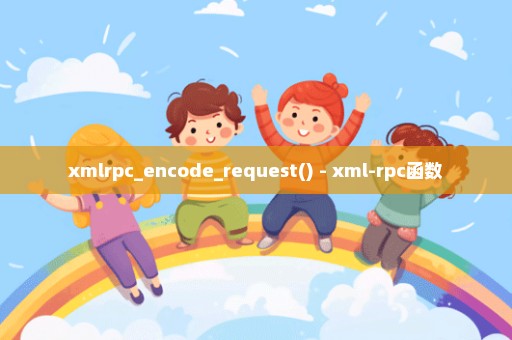xmlrpc_encode_request() - xml-rpc函数
xmlrpc_encode_request()
(PHP 4 >= 4.1.0, PHP 5, PHP 7)
为 PHP 的值生成 XML
说明
xmlrpc_encode_request(string $method, mixed $params[,array $output_options]): stringWarning此函数是实验性的。此函数的表象,包括名称及其相关文档都可能在未来的PHP 发布版本中未通知就被修改。使用本函数风险自担。
参数
$methodName of the method to call.
$paramsMethod parameters compatible with method signature.
$output_optionsArray specifying output options may contain(default values are emphasised):
output_type: php,xml
verbosity: no_white_space, newlines_only,pretty
escaping: cdata,non-ascii, non-print, markup(may be a string with one value or an array with multiple values)

version: simple,xmlrpc, soap 1.1, auto
encoding:iso-8859-1, other character set supported by iconv
返回值
Returns a string containing the XML representation of the request.
范例
XMLRPC client functions example
参见
stream_context_create()创建资源流上下文file_get_contents()将整个文件读入一个字符串xmlrpc_decode()将 XML 译码为 PHP 本身的类型
Binary strings (set with xmlrpc_set_type) go into a ... block like you'd expect. But after every 80th character, this function inserts the XML entity "
", which is a Unicode newline, as if to cause a line-wrap, which is admittedly silly.
Silly though it may be, it causes real problems for some XML-RPC servers, such as http://jakarta.apache.org/xmlrpc/ (nee Helma). Stripping out those entities with something like
$req = preg_replace('/
/', '', xmlrpc_encode_request("my.method", $args));
works around the problem.It should be noted that encoding does not seem to encode anything, just specify what goes into the XML header. We had problems with double-encoded UTF strings being saved to database when using this function, sending it of to a apache xml-rpc servlet and storing it in mysql database. It was solved by setting 'escaping' to just 'markup' and 'encoding' to 'UTF-8' (don't forget to set 'utf-8' in xmlrpc_decode too). It seems that UTF-8 encoded strings gets escaped with their bytes as entities instead of their characters as entites.
The example above is incorrect - the header needs to be an array, see post by "chris dot vigelius at gmx dot net": http://au.php.net/manual/en/function.stream-context-create.php#74431 His post also shows how to do browser authentication, as below: 1 - EDITOR NOTE: THIS IS A FIX FROM "SandersWang dt php at gmail dot com"
This function should be used by an XML-RPC client to create an XML payload for an XML-RPC request; Produces; system.methodHelp system.methodSignature The second argument recognises the type of variable and generates the correct XML-RPC structure. See xmlrpc_encode() for more details.
Simple OO client with function Overload :
the php metho test_helloworld is translated to xmlrpc method test.helloworld.
class RpcClient {
private $_methods;
private $_context;
private $_url;
function __construct ($url, $user, $passwd) {
$auth = base64_encode(sprintf('%s:%s', $user,$passwd));
$this->_context = stream_context_create(array(
'http' => array(
'method' => 'POST',
'header' => "Content-Type: text/xml\r\n".
"Authorization: Basic $auth" ,
)
));
$this->_url = $url;
$this->registerMethod ("Test_HelloWorld");
}
function __call($methodName, $params) {
if (array_key_exists($methodName,$this->_methods)) {
// on appelle la fonction RPC
$m = str_replace('_', '.', $methodName);
$r = xmlrpc_encode_request($m, $params,array('verbosity'=>'newlines_only'));
$c = $this->_context;
stream_context_set_option($c,'http','content',$r);
$f = file_get_contents($this->_url,false,$c);
$resp = xmlrpc_decode($f);
return $resp;
} else {
// on appelle la fonction de l'objet
call_user_method_array($methodName, $this,$params);
}
}
private function registerMethod ($method) {
$this->_methods[$method] = true;
}
}Note that as far as I can tell, the characters generated by PHP in the base64 fields don't appear to violate the XML-RPC standard at all. XML-RPC messages *are* in XML format, and as such, the XML entities should be getting decoded before being passed to a base64 decoder. So, the previously-mentioned Jakarta-based XML-RPC server appears to violate the XML spec. i.e. There's nothing here that needs to be "fixed" in PHP.
Take care that this function will generate invalid xmlrpc content when invoked with certain parameters (said content will be happily parsed by the lib itself, but not by other implementations).
xmlrpc_encode_request(null, null)
will generate a response without a value
xmlrpc_encode_request('myfunc', array('faultCode' => 666, 'faultString' => 'hello world')
will generated a request containing a member instead of For examples / documentation of the array output_options, see http://xmlrpc-epi.sourceforge.net/main.php?t=php_api#output_options In short, output_options lets you send compact xmlrpc (without all the "pretty whitespace" xmlrpc_encode adds normally), apply an own escaping table prior to sending, set the encoding, and a couple of other things (the page even says something about soap 1.1 ... I don't know details).
ever tried transmitting an array like the following with xmlrpc?
$var1=array(7=>14,9=>18);
The output array looks quite different! It will look like that:
$var2=array(14,18);
The only solution i found is to prepend a space to the index:
$var3=array(' 7'=>14,' 9'=>18);
Using that method you'll get the right result. ($var1)鹏仔微信 15129739599 鹏仔QQ344225443 鹏仔前端 pjxi.com 共享博客 sharedbk.com
图片声明:本站部分配图来自网络。本站只作为美观性配图使用,无任何非法侵犯第三方意图,一切解释权归图片著作权方,本站不承担任何责任。如有恶意碰瓷者,必当奉陪到底严惩不贷!
 百科狗
百科狗



